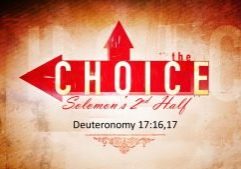Mark 9:14-29
Introduction
: The Difference Between Faith and Belief
Intro
. Continued: If you ask most people, they’ll tell you that faith and belief are the same thing. I used to think so myself. And that leads to all sorts of confusion.
The trouble is they are interrelated
, which makes them very close in meaning. So close, in fact, that many modern Bible translations don’t always differentiate clearly between the two. And that leads to even more confusion.
When we equate faith and belief it can make Jesus seem a little contradictory.
For example here is how the
New Living Translation
presents Matthew 17:20.
“You don’t have enough faith,” Jesus told them. “I tell you the truth, if you had faith even as small as a mustard seed, you could say to this mountain, ‘Move from here to there,’ and it would move. Nothing would be impossible.”—
Matthew 17:20 (NLT)
Reading that, it seems like Jesus is telling his disciples that their problem is they don’t have enough faith. I mean what else can “you don’t have enough faith” mean, right?
But then he goes on to explain that by saying that we barely need any faith at all to see great miracles happen. Huh?
That doesn’t make sense. Why would he acknowledge that they had any faith at all if his lesson from that “teachable moment” was that they only needed a tiny amount of faith?
How much “small as a mustard seed” faith is enough? Presented that way it makes it seem like we need some standard to measure microscopic faith in amounts even smaller than a mustard seed.
Don’t know about you, but I can’t make any sense of that.
Now let’s look at how the
New King James Version
translates that same verse.
So Jesus said to them
, “Because of your unbelief; for assuredly, I say to you, if you have faith as a mustard seed, you will say to this mountain, ‘Move from here to there,’ and it will move; and nothing will be impossible for you.
What Is Belief?
To explain the difference, let’s start with belief. What does it mean?
Belief
– An opinion or judgement in which a person is fully persuaded.
So our beliefs are things that we are thoroughly convinced of. Usually (but not always) they are ideas, concepts that we gather through acquiring information and experience. Because of that, our beliefs can change over time as we gain more knowledge and experience more things throughout our lives.
How Is Faith Different?
To me, this is an easier way to understand it.
Faith
= ( Belief × Action × Confidence )
Faith includes our beliefs, but it is bigger than that. Faith requires action. If it doesn’t move us to do something or say something – actually take some kind of action – it’s not really faith at all. James said it this way.
So you see, faith by itself isn’t enough. Unless it produces good deeds, it is dead and useless.—
James 2:17
Until we take action our “faith” is just a bunch of words. James says that unless faith produces action is in fact dead, or not faith at all.
As a side note, some people get confused and turned around on this point and try to do good things to generate faith. However James didn’t say the good things we do produce faith. He said our faith, if it is real and alive, will naturally move us to do good things.
But I digress.
Confidence
– Trust that is based on knowledge or past experience
———————————————————
Rea Nolan Martin – Huffington Post
Illustration
:
‘Confusion between these essential ideas created nearly insurmountable crises of faith in my life just when I needed faith most. Searching frantically for faith, I instead pulled out an entire wardrobe of beliefs.
Surely this will fit! Surely that!
But nothing fit. And nothing matched. My beliefs, however deep, broad, educated, flexible, magical and divine, did not suit the crushing occasion. As the experience continued and only got worse, I felt terrified, naked, vulnerable, unfit, and unloved by a God I had served well. On top of everything else, I was hurled headlong into an identity crisis.
Who am I if not my beliefs?’
Belief is a product of the mind
. A victim mind is already disadvantaged, but even a healthy, enabled mind runs into trouble.
The enabled mind may say,
“God is faithful. He will: answer my prayers; cure my child; land the plane safely; reconcile my marriage; replenish my wealth. God is just and will set things right.”
The enabled mind says that if we hold our beliefs strongly enough, God will listen and favor us.
If we only believe!
Believe in what though? Believe in our own version of an indefinable Being who transcends us and all created things? Our beliefs are mostly narrow and rooted in culture and upbringing. Sometimes our most closely held beliefs are in direct conflict with everything else we know to be true
.
Belief is a product of the mind, but faith is not
. Faith is a product of the spirit.
The mind interferes in the process of faith more than it contributes to it. To have faith in the worst of times will no doubt require us to silence, or at least quiet, the mind. Faith is what happens when our beliefs run aground. The spirit can be buoyed by our beliefs, but can also be brought down by them when they prove inadequate, as they most certainly will at some point in the journey. Even the beliefs humans have held most closely have come and gone over the course of a lifetime or a millennium.
—————————————————————————————————————————————————————————————————————————————————————————————–
Back to Text: What do we find?
Application
: So don’t be discouraged…keep praying, keep believing, keep exercising faith!
Question
: Was he referring to people in generation or to the disciples = (those who a work in progress), or both?
Some translations have the wording as ‘you are unbelieving’ or maybe it is ‘faithless?’
It could be a generalized comment that then pierces into the hearts of those who along with believing also have genuine faith and all the combinations of percentages or whatever.
Faith is
: From Text
I don’t know what disciples did after that point. Did you grow? Were they discouraged? Did they feel inferior?
One thing it appears did happen, is that they went on.
Conclusion
: SO, what is the answer to difference between belief/unbelief and faith?
Maybe
, the difference is that Faith goes on after believing is challenged and not immediately forth coming.
What we should have without any doubt is that with faith, all things are possible (even the things we can’t resolve or dictate)!

February 12 – Wisdom in Speech
1 Peter 3:10 Introduction: Today I continue my thoughts about wise living by addressing our speech (what we say, and why we say) what is right or appropriate. Read: 1 Peter 3:10 “ For “He who would love life And see good days, Let him refrain his tongue from evil, And his lips from speaking…

February 5 – Wise Up – Alliances
I Kings 11 Read: 1 Kings 12:1-20 Introduction: I wish to continue my studies with you about “wising up.” I want to speak to you about the wisdom on allegiances and alliances . Interrogative : Who do / should we listen to; whom should we follow and whose counsel do we connect ourselves with and…

January 29, 2017 – Fix or Facts
“Fix or Facts: Flight or Favor” Jeremiah 42:1-6 Read Jeremiah 42:1-6 Introduction : Several weeks ago, In my readings I came across a section of Scripture in Jeremiah that arrested my attention. I put in the margins of my devotional bible, Prophetic 2017? Context of Jeremiah 42 A small remnant of Judah under the de…

January 22, 2017 – Wise Up – Week 3 – Stewardship Part 2
Wise in Stewardship – Part 2 Introduction : Week three of ‘Wise Up.’ Week one general insturctions about necessity and wisdom of pursuing wisdom. Wee 2 (Last Week) The concept in the NT that describes and defines what it means to be a servant before Christ is the word steward or stewardship . How one…

January 15 – Wise About Stewardship
Wise in Stewardship Proverbs 3:9-10 (11,12) Introduction : One of the most important lessons that needs to be understood as we become bible following Christians has to do with how we conduct our lives as it relates to how, where and why we use our blessings to serve and honor the Lord. The concept in…

The Ways of Wisdom – January 8, 2017
Proverbs 3 – Part 1 3:1-6 Introduction : I choose to begin the new year with a series of teachings from the proverbs and specifically proverbs chapter 3. Context : As a whole, the Proverbs are given to us as short and important little teachings that are designed to direct and instruct us in our…

One of Us
John 1:1-14 Introduction : Just a couple of more Sundays and Christmas is here. What a wonderful time. What a wonderful season. What a wonderful message. I want to speak about what is called and understood as the incarnation of Christ. 1 John 1:1-14 is a very familiar passage for most. John 1:1 “In the…

Solomon’s 2nd Half
Deuteronomy 17:16-17 Introduction : Last week I spoke to you from 2 Chronicles 7:14 and how God spoke to Solomon about not only his life but the life of the community and what would make it great and what would bring its demise. I told you that Solomon started well: Unfortunately Solomon did not…

